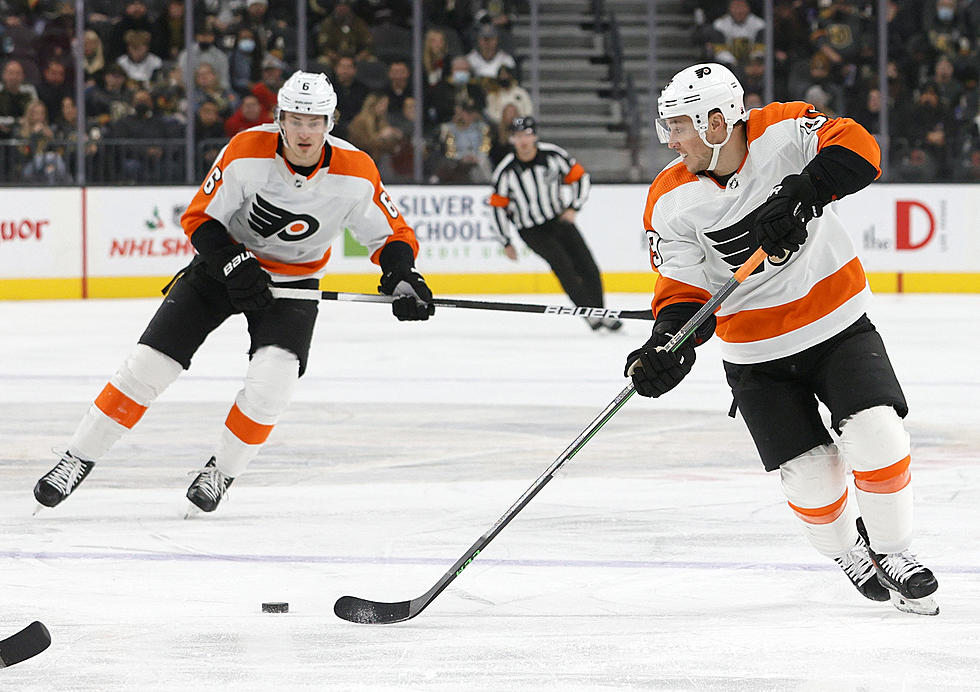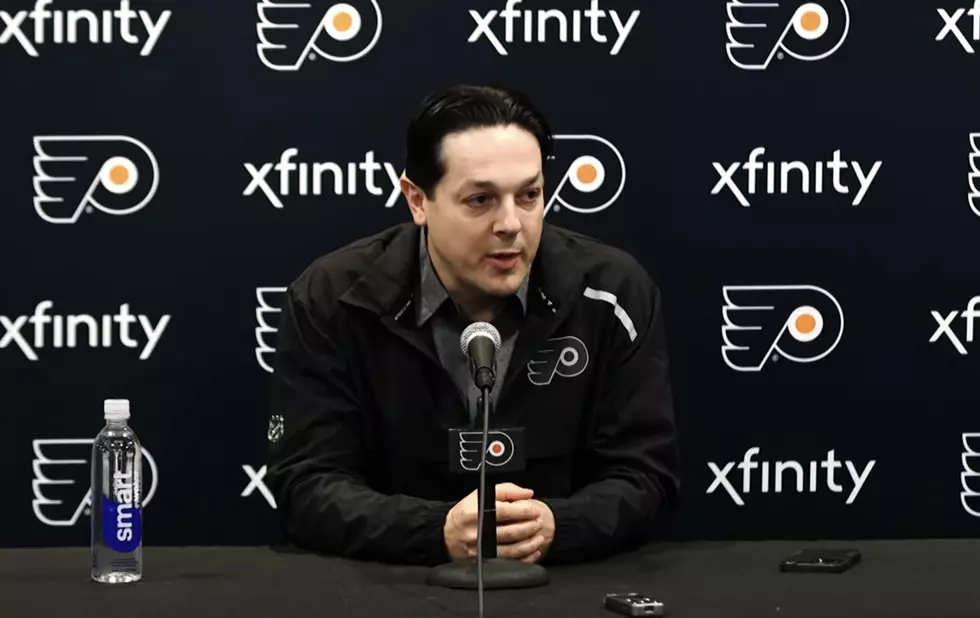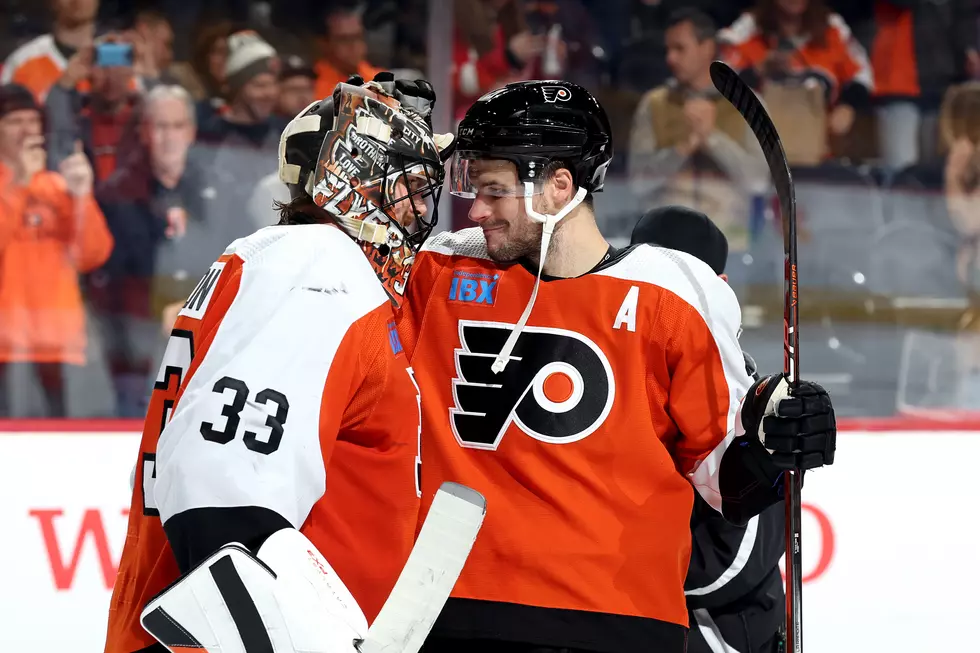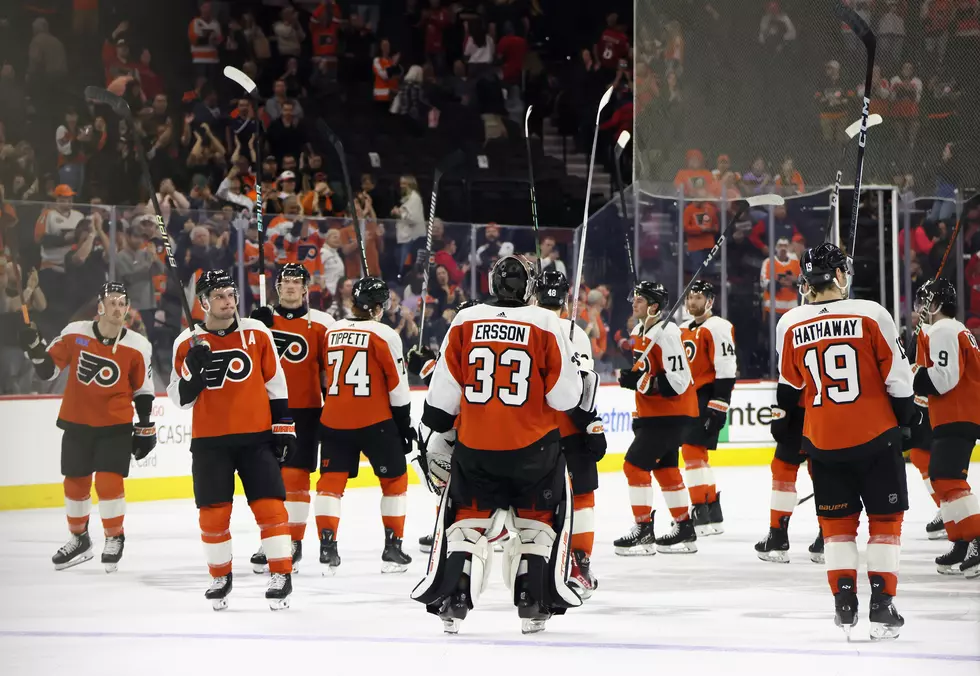
Flyers 5: Takeaways from Tuesday’s Flyers-Ducks Game
The Flyers were already in a hole with the absence of two more players in COVID protocol entering Tuesday’s game. The fact that they were facing a team dealing with COVID issues of their own meant very little.
The Ducks are an upstart team with a ton of potential. That’s easy to see. They showed plenty of it from the youngsters still in the lineup, ending the Flyers road trip on a sour note as tougher matchups are ahead.
Here are five takeaways from Tuesday’s 4-1 Flyers loss to the Ducks.
1. World Junior Flashbacks
The last week of December and first week of January are usually reserved for the World Junior Championship. This year, COVID had other ideas and forced the cancellation of the tournament.
Back in 2017, Carter Hart was the starting netminder for Team Canada and Troy Terry was one of the budding young players on the US team. Terry scored the game-winning goal in the deciding shootout of the Gold Medal Game.
Terry had a hat trick in Tuesday’s game, and his second goal in particular was very reminiscent of that World Junior result. It wasn’t the same move, but Terry had a breakaway and made the most of it, going to the backhand and going upstairs with the shot.
Terry’s other two goals on the night came on a deflection and an empty-net goal. He’s at 21 goals on the season, third in the NHL, and it was his first career hat trick.
2. Tip Drill
After Terry struck twice in the first, the Flyers were closing in on another underwhelming start that left an uphill battle, down by two goals. But with just 1:18 left in the first, the two Flyers that seem to be most consistent at producing points lately came through.
Scott Laughton, back in the lineup, made a drop pass to Joel Farabee. Farabee quickly found Cam Atkinson in the slot for the redirection and scored his team-leading 13th goal of the season.
That was a game-changer entering the second period. It gave the Flyers some life with 40 minutes to go and a chance to possibly work their way back into the game. Unfortunately for them, the second period featured a handful of chances and no goals, and the Ducks were able to capitalize on an opportunity late in the period that ultimately put the game away.
3. Always Sonny
With 3:14 to play in the second, Morgan Frost took a goalie interference penalty that gave the Ducks a power play.
To that point in the period, it had been quite eventful for Sonny Milano. On one shift, Milano was leveled three times by Rasmus Ristolainen, but continued to battle through and get up each time. By the end of the shift, he was partially behind the net and attempted the same flip pass over the top that he was on the receiving end of just a few weeks earlier. You know, the Zegras pass.
Trevor Zegras wasn’t in the lineup this time due to COVID protocols, and no, this pass didn’t connect, but it showed just how much some of these players are feeling it for Anaheim. On the power play late in the period, they made quick work with some precise passing that ultimately led to a goal for Milano.
The Flyers challenged for goalie interference and lost, resulting in another power play for Anaheim. The Ducks didn’t score on that one with 2:11 still remaining in the period, but it essentially wiped out the rest of the second and sent the Flyers into the third down by two and looking at another uphill battle.
4. Identity Crisis
Something I brought up on GameNight prior to Tuesday’s game was how the next month would really shape what the Flyers identity is this season. To this point, they don’t really have one. They are mostly an average team that plays boring hockey and, mostly, ends up on the wrong side of the results.
Yes, they had a seven-game points streak and won five games during that time, but that followed 10 straight losses, and here they are again after closing out the road trip with three straight losses.
On the other side, even without Zegras or captain Ryan Getzlaf, the Ducks look like a team that knows who they are. They can play with speed. They have creativity. They are a fun group to watch.
This was not one of their best games by any stretch. They got quality goaltending from John Gibson, making 28 saves on the night, and were missing some of the players that draw a crowd.
But, look at their recent draft results to see how this is a team in the earliest stages of breaking out and becoming a perennial contender.
- Troy Terry was a fifth-round pick in 2015. Since reaching the NHL, he has 36 goals and 82 points in 164 games.
- Max Jones and Sam Steel were late first-round picks in 2016. Both have already logged 293 NHL games combined.
- Max Comtois was a second-round, 50th overall pick in 2017. He has 23 goals and 31 assists for 54 points in 110 career games.
- Isac Lundestrom was the team’s first-round pick at 23rd overall in 2018. He has 31 points in 107 NHL games.
- Trevor Zegras, the ninth overall pick in 2019, has star-potential. In just 54 NHL games, he has 11 goals and 38 points.
- Jamie Drysdale, the sixth overall pick in 2020, is going to be the team’s defensive anchor. He already has 18 assists and 24 points in 60 NHL games.
- The Ducks drafted Mason McTavish with the third overall pick in 2021. He played the maximum nine games before returning to juniors, but scored two goals and had three points in that time as an 18-year-old.
And that’s just some of the recent draft picks. Add in that Sonny Milano is 25. Veterans like Rickard Rakell and Hampus Lindholm are 28. Josh Manson and Cam Fowler are 30. Jakob Silfverberg, Adam Henrique, and Derek Grant are 31. Even Kevin Shattenkirk is still 33 and has a few seasons ahead of him. They are also set in net with 28-year-old John Gibson.
To top it all off, they are led by 36-year-old Ryan Getzlaf, who only has 1,130 career games, 281 goals and 1,004 points to his credit.
Don’t sleep on this team come playoff time this season, and certainly expect whatever they accomplish this season to grow even more in the coming years. Their core is set. They are establishing an identity. And it’s going to take them places.
5. Homecoming
If there’s one bit of good news for the Flyers, it’s the amount of time they will spend at home in the coming weeks. After four games on the West coast, not only are the Flyers After Dark episodes for this season complete, but there will be very limited travel from here for the next while.
In fact, from now until March 10, over two months, here’s the list of road games for the Flyers:
- Thursday, Jan. 13 at Boston
- Monday, Jan. 17 at NY Islanders
- Saturday, Jan. 22 at Buffalo
- Tuesday, Jan. 25 at NY Islanders
- Wednesday, Feb. 23 at Detroit
- A TBD rescheduled date for a road game in Pittsburgh
Every one of those road games is nothing more than a quick trip. The team plays the next three games at home, then heads to Boston. They return home to play the Rangers, then have a home-and-home with the Islanders and another home game against Columbus. They go to Buffalo, then come home to play Dallas. They have another road game against the Islanders, then are home for the final two games before the previously-scheduled Winter Olympic break.
Somewhere in that two-and-a-half week gap, the Flyers have a game in Pittsburgh from Dec. 23 that will likely be rescheduled. They also have two home games, one against Washington from Dec. 21. The other is a game against Detroit, originally scheduled for Jan. 18, but since replaced with a makeup date against the Islanders from Nov. 30.
Even so, those three games will likely all be made up in that time. After that, there’s just a trip to Detroit on Feb. 23, the first game out of that original break, before a six-game homestand.
That means the Flyers will potentially play 17 of their next 23 games on home ice. The limited travel can only help the Flyers if they want to pursue a possible playoff spot and turn this season around for good. But all of that is easier said than done and, based on recent results, may not even matter in the long run.
But if there’s a time to go on a run and start piling up points again, it’s now, not just for where the team is in the season, but for how much potential downtime you have to get more practices in, to be at home more often, to rest and get healthy, all with minimal travel.
Kevin Durso is Flyers insider for 97.3 ESPN and Flyers editor for SportsTalkPhilly.com. Follow him on Twitter @Kevin_Durso.
Philadelphia Flyers Uniforms Through The Years
More From 97.3 ESPN









